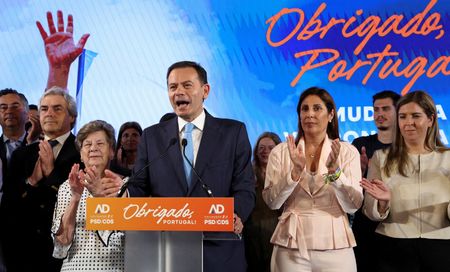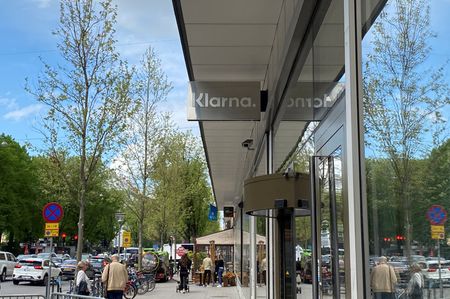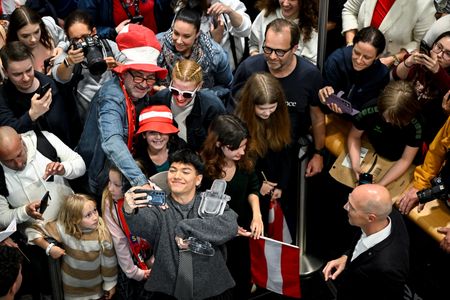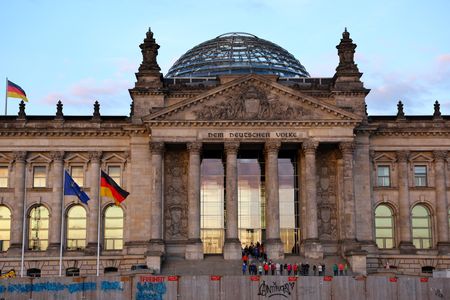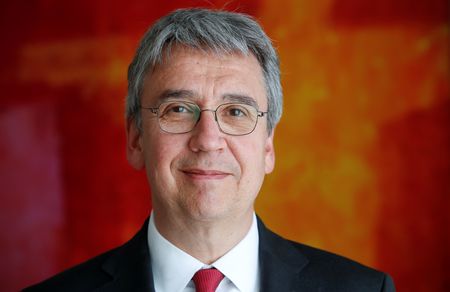By Sergio Goncalves, Catarina Demony and Andrei Khalip
LISBON (Reuters) -Portugal’s far-right Chega won a record vote share in Sunday’s snap election and was vying to become the main opposition party as the ruling centre-right Democratic Alliance (AD) again fell short of a majority needed to end a long period of instability.
Prime Minister Luis Montenegro – whose grouping won the most seats – said the election result was a vote of confidence in his party. However, with votes from abroad still to be counted Chega could supplant the centre-left Socialists as leader of the opposition, ending five decades of dominance by the country’s two major parties.
“We’ve done what no other party has ever achieved in Portugal. We can safely declare in front of all the country today that bipartisanship in Portugal is over,” Chega leader Andre Ventura told a crowd of jubilant supporters in Lisbon.
“Nothing will be as it was,” he said, highlighting the fact that the continued rise of Chega, which he founded just six years ago, proved most opinion polls wrong.
Chega gained 8 seats for a total of 58 in the 230-seat parliament, winning a record 1.34 million votes, or 22.6%.
Montenegro, whose AD won 89 seats – up nine from the previous election – and 32.1% of the vote, has refused to make any deals with Chega and said he would form a new minority government.
Chega, which has allied with Europe’s hard-right, anti-immigration parties, such as Marine le Pen’s Rassemblement National in France and Germany’s AfD, has proposed tougher sentences for criminals, including chemical castration for repeat rapists, and called for an end to “open doors” immigration. It has also accused mainstream parties of perpetuating corruption.
Continued political instability could delay structural reforms and major projects in Portugal, including lithium mining in the north, and potentially compromise the efficient deployment of EU funds and the long-delayed privatization of TAP airline.
The election, the third in as many years, was called one year into an AD minority government’s term after Montenegro failed to win a vote of confidence in March when the opposition questioned his integrity over dealings of his family’s consultancy firm. He has denied any wrongdoing.
“The Portuguese don’t want any more snap elections, they want a four-year legislature,” Montenegro said as his supporters chanted “Let Luis work,” his campaign slogan.
Voters appeared to punish the Socialists for their role in bringing down Montenegro’s government with the party falling to 58 seats from 78, prompting leader Pedro Nuno Santos to say he would step down.
In Lisbon, some residents were worried about what Chega’s surge could mean for Portugal’s democracy, comparing the party to U.S. President Donald Trump’s government.
Antonio Albuquerque, 65, said it was the first time in his life that he had not voted because he did not trust any of the parties.
“Look across the ocean and see if there is a risk or not. What is Trump doing? I think we are in danger, right?” he said.
Chega’s Ventura, who was hospitalised during the campaign after collapsing on stage with an esophageal spasm, said his health issues would not hold him back.
“There are moments in life during which God says, just stop a little bit,” he said. “This time I am not going to listen. I am not going to stop until I become the prime minister of Portugal.”
(Reporting by Sergio Goncalves, Catarina Demony; Writing by Charlie Devereux; Editing by Toby Chopra)

